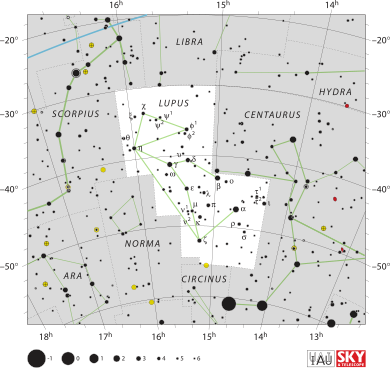Lupus (constellation) facts for kids
| Constellation | |

List of stars in Lupus
|
|
| Abbreviation | Lup |
|---|---|
| Genitive | Lupi |
| Pronunciation | genitive |
| Symbolism | the Wolf |
| Right ascension | 15.3 |
| Declination | −45 |
| Quadrant | SQ3 |
| Area | 334 sq. deg. (46th) |
| Main stars | 9 |
| Bayer/Flamsteed stars |
41 |
| Stars with planets | 5 |
| Stars brighter than 3.00m | 3 |
| Messier objects | 0 |
| Bordering constellations |
Norma Scorpius Circinus Centaurus Libra Hydra (corner) |
| Visible at latitudes between +35° and −90°. Best visible at 21:00 (9 p.m.) during the month of June. |
|
Lupus is a fascinating constellation found in the southern sky. Its name means "the Wolf" in Latin. This constellation is known for its bright stars and interesting deep-sky objects.
You can best see Lupus during the month of June. It is a great constellation for exploring with a telescope.
Contents
Discovering Lupus, The Wolf Constellation
Lupus is a constellation that looks like a wolf. It is located in the southern part of our night sky. This means you need to be in the Southern Hemisphere to see it well. People in the Northern Hemisphere might only see it if they are close to the equator.
Lupus is one of the 48 constellations listed by the ancient astronomer Ptolemy. It is still recognized as one of the 88 modern constellations today. It covers a large area of the sky, ranking 46th in size.
Where to Spot Lupus
Finding Lupus in the sky is easier if you know its neighbors. It is surrounded by several other well-known constellations. These include Scorpius (the Scorpion) and Centaurus (the Centaur).
It also borders Norma (the Set Square) and Circinus (the Compass). Knowing these nearby constellations can help you locate Lupus. Look for it near the bright star Alpha Centauri in Centaurus.
Stars of Lupus
Lupus has many stars, some of which are quite bright. Its brightest star is called Alpha Lupi, also known as Men. This star shines with a magnitude of 2.30. It is a very hot and luminous star.
There are about 9 main stars that form the shape of the wolf. In total, 41 stars are visible to the naked eye. Five of these stars are known to have planets orbiting them. This makes Lupus an interesting area for astronomers studying exoplanets.
One of the closest stars to us in Lupus is LHS 397. It is about 19.35 light-years away. This is a relatively close neighbor in the vastness of space.
The Story Behind Lupus
The constellation Lupus has been known as a wolf for a very long time. Ancient Greek astronomers saw it as a wild animal. Sometimes, it was shown being held by the Centaur, Centaurus.
In some stories, Lupus was not just a wolf. It was sometimes seen as a wild beast being hunted. This connection to hunting fits with the idea of a wolf. The constellation's name has stayed the same for centuries.
Images for kids
See also
 In Spanish: Lupus (constelación) para niños
In Spanish: Lupus (constelación) para niños
 | Kyle Baker |
 | Joseph Yoakum |
 | Laura Wheeler Waring |
 | Henry Ossawa Tanner |


